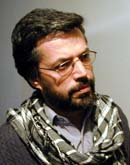Andrew
Maykuth Online
|
 |
Younus Qanooni |
DALAN
SANG, Afghanistan - A secret American military delegation met with anti-Taliban
leaders along the front lines here just before U.S. warplanes began
bombing Taliban troop positions, a top opposition official said yesterday.
The
team of 12 American military advisers flew into the heart of Afghanistan
and promised greater support to leaders of the guerrillas fighting the
country's hard-line Islamic rulers, the official said.
Yonus
Qanooni, the acting interior minister for Afghanistan's
government-in-exile and a member of its 11-man central committee, said the
U.S. military delegation met with opposition Northern Alliance leaders in
the Panjshir Valley last week and surveyed the region by helicopter.
The
Americans also visited Khoja Bahauddin, a guerrilla military base near the
border of Tajikistan.
"They
came to learn about the situation in Afghanistan," said Qanooni, who
described the visitors as nonuniformed representatives of the American
military who flew in from Tajikistan and were in Afghanistan for less than
three days. "They made a promise to support us, but they weren't
specific."
He
did not identify the Americans or their specific military affiliations.
Qanooni
also acknowledged that alliance forces assaulting the northern city of
Mazar-e Sharif had underestimated the Taliban forces there and had been
forced back.
On
Sunday, American jets began bombing frontline Taliban positions, seemingly
in response to complaints from guerrilla leaders that most American bombs
since the military campaign started Oct. 7 had failed to inflict serious
damage on the Taliban because they were aimed at fixed military
installations rather than concentrations of troops.
Qanooni
said he had no doubt that the shift in U.S. strategy - along with public
statements by Secretary of State Colin L. Powell and Defense Secretary
Donald H. Rumsfeld in recent days that more explicitly support the
Northern Alliance - came as a result of the meetings.
The
meetings and the change in strategy signal a closer cooperation between
the Americans and the Northern Alliance, a coalition of ethnic and
political groups opposed to the Taliban. U.S. officials had been reluctant
to fully embrace the opposition in deference to Pakistan, which regards
the alliance as dominated by northern ethnic minorities hostile to its
interests.
"The
U.S. attacks are more efficient than before," Qanooni said.
"Most of the important Taliban people are on the front lines."
While
encouraged by the new strategy of striking the Taliban's front, Qanooni
said the strikes were "not enough."
The
aerial assaults of frontline positions continued for a third day yesterday
as U.S. jets roared overhead, dropping their payloads a few miles behind
the line that extends for 20 miles across the broad Shamali Plain, a
farming region about 25 miles north of the capital, Kabul.
Taliban
and guerrilla forces exchanged sporadic rocket, mortar and rifle fire
along the front. At least one rocket, apparently fired by the Taliban,
slammed into the bazaar in the town of Charikar, five miles behind the
front lines, killing two people and injuring 18.
Qanooni
said the Northern Alliance, also known as the United Front, had made its
first military priority the capture of Mazar-e Sharif, the largest city in
northern Afghanistan. The city occupies a key position on supply routes
from Uzbekistan, where American troops are stationed. Its capture would
allow the alliance to also recapture much of the area of its strongest
support, which fell into Taliban hands in the last three years.
"We
are not in a hurry to go to Kabul or attack Kabul," Qanooni said. He
said the alliance wanted to solidify arrangements for a post-Taliban
government before entering the capital, including incorporating more
ethnic Pashtuns into its leadership. Pashtuns are the country's largest
ethnic group and make up much of the leadership of the Taliban.
But
Qanooni said the alliance did not rule out an attack if the fortified
Taliban front line north of Kabul collapsed.
The
opposition leader, who was interior minister for four years before the
Taliban ousted the government of President Burhanuddin Rabbani from power,
acknowledged that overconfident anti-Taliban rebels had failed to
coordinate their forces around Mazar-e Sharif last week and had lost the
initiative.
Four
separate rebel forces had encircled Mazar-e Sharif last week, and
opposition leaders announced its imminent capture. But only one of the
armed groups under the direction of Ato Mohammed attacked while the three
other forces held back and assumed the Taliban forces, weakened by U.S.
bombing, would collapse without much of a fight.
But
the Taliban forces counteracted vigorously and forced the guerrillas to
retreat.
"Our
forces weren't serious about capturing Mazar," said Qanooni, a close
lieutenant to Ahmed Shah Massoud, the legendary mujaheddin military leader
who was assassinated Sept. 9. "They didn't think the Taliban would
counterattack."
The frank admission raises questions about the ability of opposition forces to coordinate an attack. The alliance forces, organized under various local and regional military leaders, have spent as much of their history fighting among themselves as they have fighting a common enemy.